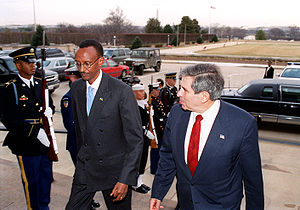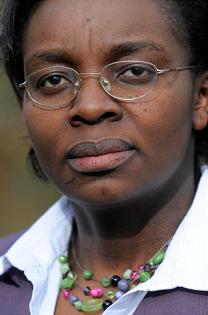 While the Rwandan president is celebrated for rebuilding his country after its horrific genocide, over the past year he has brutally suppressed his political opposition, arresting presidential rivals and censoring journalists. This month, a leaked U.N. report accused Kagame’s militias of murdering and raping thousands of members of the Hutu ethnic group who fled over the border to Congo in the late 1990s.
While the Rwandan president is celebrated for rebuilding his country after its horrific genocide, over the past year he has brutally suppressed his political opposition, arresting presidential rivals and censoring journalists. This month, a leaked U.N. report accused Kagame’s militias of murdering and raping thousands of members of the Hutu ethnic group who fled over the border to Congo in the late 1990s.Yet here at the Clinton Global Initiative, Kagame has one very powerful defender: Bill Clinton himself. At last year’s CGI conference, Clinton presented Kagame with a Global Citizen Award. At this year's event, he is promoting Rwanda's success in expanding rural health care and aid to family farmers.
Paul Kagame & Bill Clinton (AP Photo 2) Kagame has denied the accusations against him. When I asked Clinton Monday evening whether the world community should hold Kagame accountable for the violence and political suppression, he equivocated.
“The U.N. said what it did about what happened after the [Rwandan] genocide, in Congo. … Kagame strongly disputes it,” Clinton said. “Right now I’m not going to pre-judge him because there’s this huge debate about what happened in the Congo and why, and I don’t know.”
Yet the U.N. evidence against Kagame is nothing new. Activists have long accused Rwanda of ethnic and sexual violence in Congo—both in the Rwandan government’s pursuit of its own rebel groups and in Rwandan militias’ competition to access and control Congo’s lucrative mineral deposits.
“We lost our moral authority in 1994 when the genocide happened, and we allowed Paul Kagame to become the authority in the region and go into Congo.”
“It is not a matter of pre-judging,” Human Rights Watch senior Rwanda researcher Carina Tertsakian told The Daily Beast in response to Clinton’s statement. “The facts are well-established. … There is no doubt that Rwandan troops, together with their Congolese allies, committed large-scale massacres and other grave human-rights violations against Rwandan and Congolese civilians. The evidence is there for all to see. What more does Clinton need?”In part, Clinton’s defense of Kagame is unsurprising. The former president says he deeply regrets that his administration was slow to act during the Rwandan genocide of 1994, in which 10 percent of Kagame’s ethnic group, the Tutsi, were murdered—mostly by machete.
Since then, Kagame has achieved impressive results modernizing Rwandan society. He has contributed troops to U.N. peacekeeping missions, notably in Sudan, and has worked effectively with international aid groups, including the Clinton Foundation, to build a more efficient bureaucracy, particularly around public health and agriculture.
That record leaves some diplomats and humanitarians hesitant to criticize Kagame. At CGI, Rwanda is being portrayed as a model for international aid, not as a nation struggling with basic democracy and human rights. "It's the best-run nation in Africa," Clinton told me.
But overwhelming evidence emerged this year that Rwanda’s presidential election was rigged, with the Kagame regime using a law against genocide-denial to sully the reputations of government critics and prevent opposition leaders from getting on the ballot. Several dissidents even turned up dead.
In our interview Monday, Clinton downplayed the political suppression and violence, citing Kagame’s popularity among the Rwandan public. “I’ve been to Rwanda a lot. … And I’ve been out where most people don’t go. And my opinion is there is nothing that could have kept him from getting a breathtaking majority because the lives of the Rwandans have changed,” Clinton said. “It doesn’t mean it’s justifiable to muscle your opponents or anything else. It just means the next step of their democracy is going to be making more space for dissent and having the confidence that everything you’ve done is not going to be derailed if you do it.”
Clinton is undoubtedly influenced by the long-running policies of the U.S. State and Defense Departments toward Rwanda. While nations such as Sweden and the Netherlands have withheld foreign aid from the Kagame regime because of its support for armed rebel groups active inside Congo, Rwanda receives tens of millions of dollars annually from the U.S., including money for military training and weapons.

















